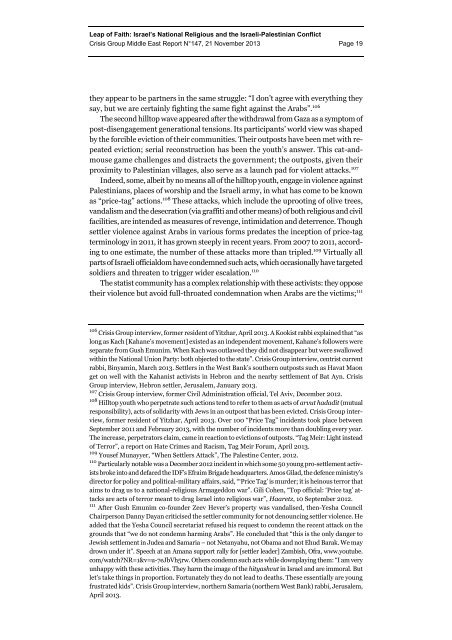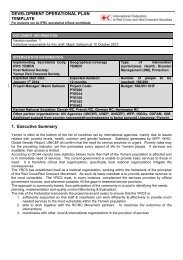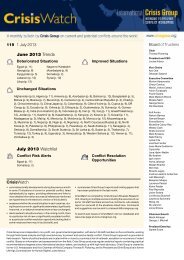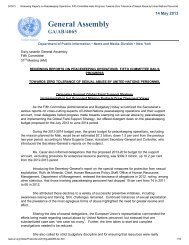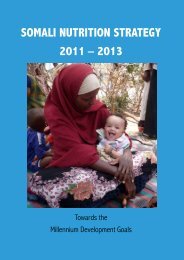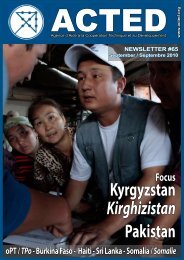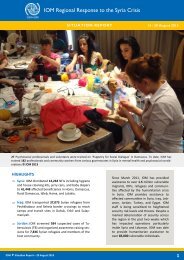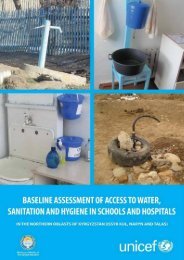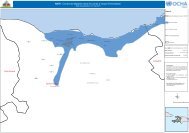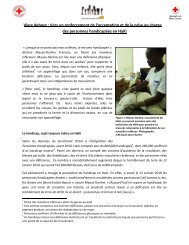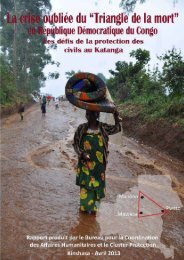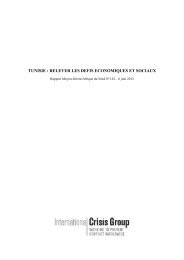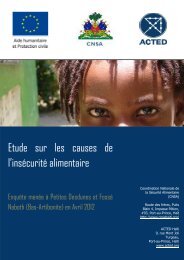Leap of Faith: Israel's National Religious and the Israeli ... - ReliefWeb
Leap of Faith: Israel's National Religious and the Israeli ... - ReliefWeb
Leap of Faith: Israel's National Religious and the Israeli ... - ReliefWeb
You also want an ePaper? Increase the reach of your titles
YUMPU automatically turns print PDFs into web optimized ePapers that Google loves.
<strong>Leap</strong> <strong>of</strong> <strong>Faith</strong>: Israel’s <strong>National</strong> <strong>Religious</strong> <strong>and</strong> <strong>the</strong> <strong>Israeli</strong>-Palestinian Conflict<br />
Crisis Group Middle East Report N°147, 21 November 2013 Page 19<br />
<strong>the</strong>y appear to be partners in <strong>the</strong> same struggle: “I don’t agree with everything <strong>the</strong>y<br />
say, but we are certainly fighting <strong>the</strong> same fight against <strong>the</strong> Arabs”. 106<br />
The second hilltop wave appeared after <strong>the</strong> withdrawal from Gaza as a symptom <strong>of</strong><br />
post-disengagement generational tensions. Its participants’ world view was shaped<br />
by <strong>the</strong> forcible eviction <strong>of</strong> <strong>the</strong>ir communities. Their outposts have been met with repeated<br />
eviction; serial reconstruction has been <strong>the</strong> youth’s answer. This cat-<strong>and</strong>mouse<br />
game challenges <strong>and</strong> distracts <strong>the</strong> government; <strong>the</strong> outposts, given <strong>the</strong>ir<br />
proximity to Palestinian villages, also serve as a launch pad for violent attacks. 107<br />
Indeed, some, albeit by no means all <strong>of</strong> <strong>the</strong> hilltop youth, engage in violence against<br />
Palestinians, places <strong>of</strong> worship <strong>and</strong> <strong>the</strong> <strong>Israeli</strong> army, in what has come to be known<br />
as “price-tag” actions. 108 These attacks, which include <strong>the</strong> uprooting <strong>of</strong> olive trees,<br />
v<strong>and</strong>alism <strong>and</strong> <strong>the</strong> desecration (via graffiti <strong>and</strong> o<strong>the</strong>r means) <strong>of</strong> both religious <strong>and</strong> civil<br />
facilities, are intended as measures <strong>of</strong> revenge, intimidation <strong>and</strong> deterrence. Though<br />
settler violence against Arabs in various forms predates <strong>the</strong> inception <strong>of</strong> price-tag<br />
terminology in 2011, it has grown steeply in recent years. From 2007 to 2011, according<br />
to one estimate, <strong>the</strong> number <strong>of</strong> <strong>the</strong>se attacks more than tripled. 109 Virtually all<br />
parts <strong>of</strong> <strong>Israeli</strong> <strong>of</strong>ficialdom have condemned such acts, which occasionally have targeted<br />
soldiers <strong>and</strong> threaten to trigger wider escalation. 110<br />
The statist community has a complex relationship with <strong>the</strong>se activists: <strong>the</strong>y oppose<br />
<strong>the</strong>ir violence but avoid full-throated condemnation when Arabs are <strong>the</strong> victims; 111<br />
106 Crisis Group interview, former resident <strong>of</strong> Yitzhar, April 2013. A Kookist rabbi explained that “as<br />
long as Kach [Kahane’s movement] existed as an independent movement, Kahane’s followers were<br />
separate from Gush Emunim. When Kach was outlawed <strong>the</strong>y did not disappear but were swallowed<br />
within <strong>the</strong> <strong>National</strong> Union Party: both objected to <strong>the</strong> state”. Crisis Group interview, centrist current<br />
rabbi, Binyamin, March 2013. Settlers in <strong>the</strong> West Bank’s sou<strong>the</strong>rn outposts such as Havat Maon<br />
get on well with <strong>the</strong> Kahanist activists in Hebron <strong>and</strong> <strong>the</strong> nearby settlement <strong>of</strong> Bat Ayn. Crisis<br />
Group interview, Hebron settler, Jerusalem, January 2013.<br />
107 Crisis Group interview, former Civil Administration <strong>of</strong>ficial, Tel Aviv, December 2012.<br />
108 Hilltop youth who perpetrate such actions tend to refer to <strong>the</strong>m as acts <strong>of</strong> arvut hadadit (mutual<br />
responsibility), acts <strong>of</strong> solidarity with Jews in an outpost that has been evicted. Crisis Group interview,<br />
former resident <strong>of</strong> Yitzhar, April 2013. Over 100 “Price Tag” incidents took place between<br />
September 2011 <strong>and</strong> February 2013, with <strong>the</strong> number <strong>of</strong> incidents more than doubling every year.<br />
The increase, perpetrators claim, came in reaction to evictions <strong>of</strong> outposts. “Tag Meir: Light instead<br />
<strong>of</strong> Terror”, a report on Hate Crimes <strong>and</strong> Racism, Tag Meir Forum, April 2013.<br />
109 Yousef Munayyer, “When Settlers Attack”, The Palestine Center, 2012.<br />
110 Particularly notable was a December 2012 incident in which some 50 young pro-settlement activists<br />
broke into <strong>and</strong> defaced <strong>the</strong> IDF’s Efraim Brigade headquarters. Amos Gilad, <strong>the</strong> defence ministry’s<br />
director for policy <strong>and</strong> political-military affairs, said, “‘Price Tag’ is murder; it is heinous terror that<br />
aims to drag us to a national-religious Armageddon war”. Gili Cohen, “Top <strong>of</strong>ficial: ‘Price tag’ attacks<br />
are acts <strong>of</strong> terror meant to drag Israel into religious war”, Haaretz, 10 September 2012.<br />
111 After Gush Emunim co-founder Zeev Hever’s property was v<strong>and</strong>alised, <strong>the</strong>n-Yesha Council<br />
Chairperson Danny Dayan criticised <strong>the</strong> settler community for not denouncing settler violence. He<br />
added that <strong>the</strong> Yesha Council secretariat refused his request to condemn <strong>the</strong> recent attack on <strong>the</strong><br />
grounds that “we do not condemn harming Arabs”. He concluded that “this is <strong>the</strong> only danger to<br />
Jewish settlement in Judea <strong>and</strong> Samaria – not Netanyahu, not Obama <strong>and</strong> not Ehud Barak. We may<br />
drown under it”. Speech at an Amana support rally for [settler leader] Zambish, Ofra, www.youtube.<br />
com/watch?NR=1&v=u-7eJbVh5rw. O<strong>the</strong>rs condemn such acts while downplaying <strong>the</strong>m: “I am very<br />
unhappy with <strong>the</strong>se activities. They harm <strong>the</strong> image <strong>of</strong> <strong>the</strong> hityashvut in Israel <strong>and</strong> are immoral. But<br />
let’s take things in proportion. Fortunately <strong>the</strong>y do not lead to deaths. These essentially are young<br />
frustrated kids”. Crisis Group interview, nor<strong>the</strong>rn Samaria (nor<strong>the</strong>rn West Bank) rabbi, Jerusalem,<br />
April 2013.


